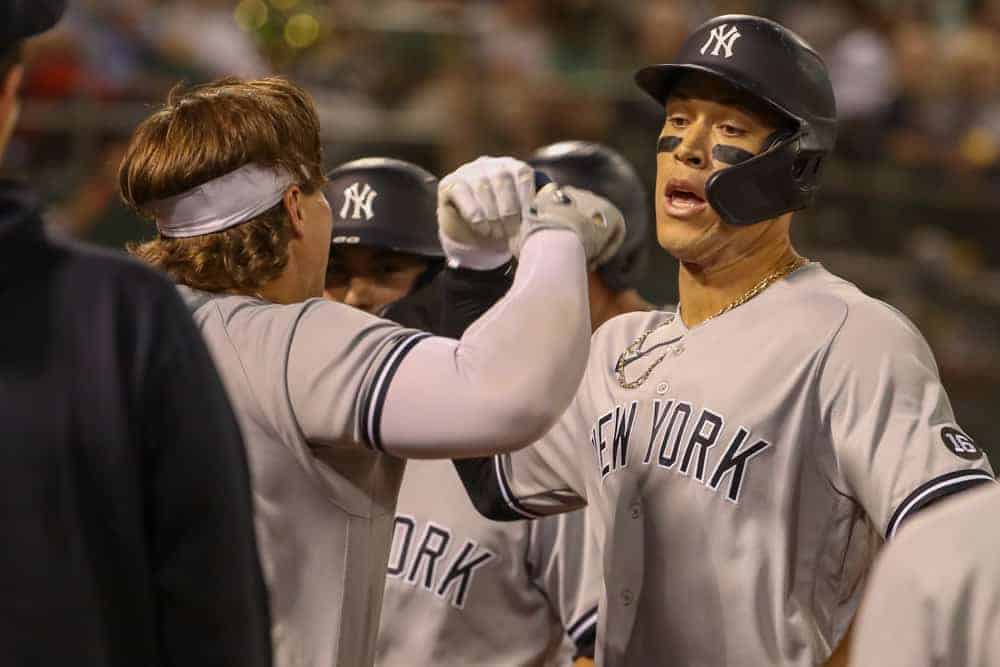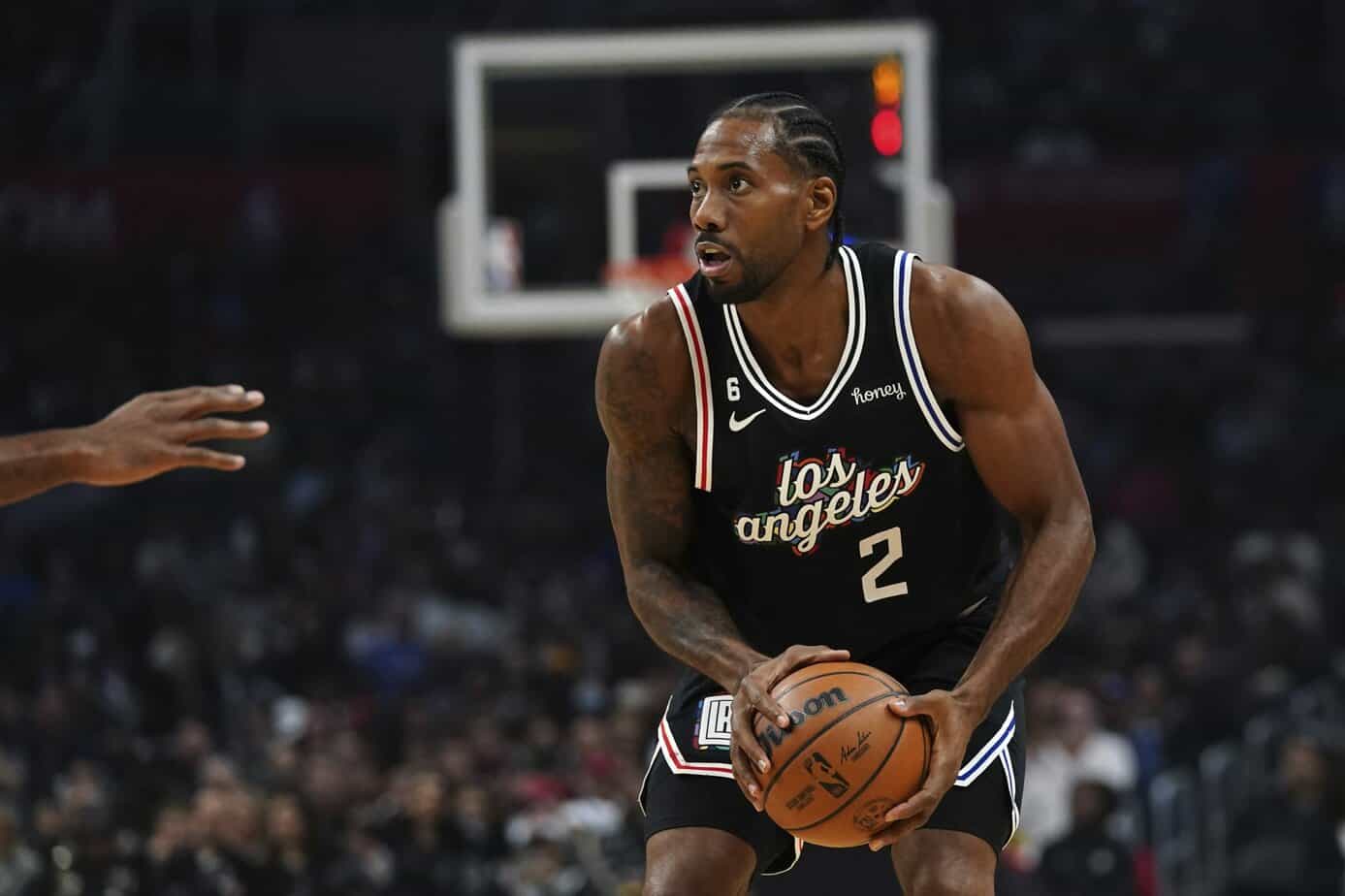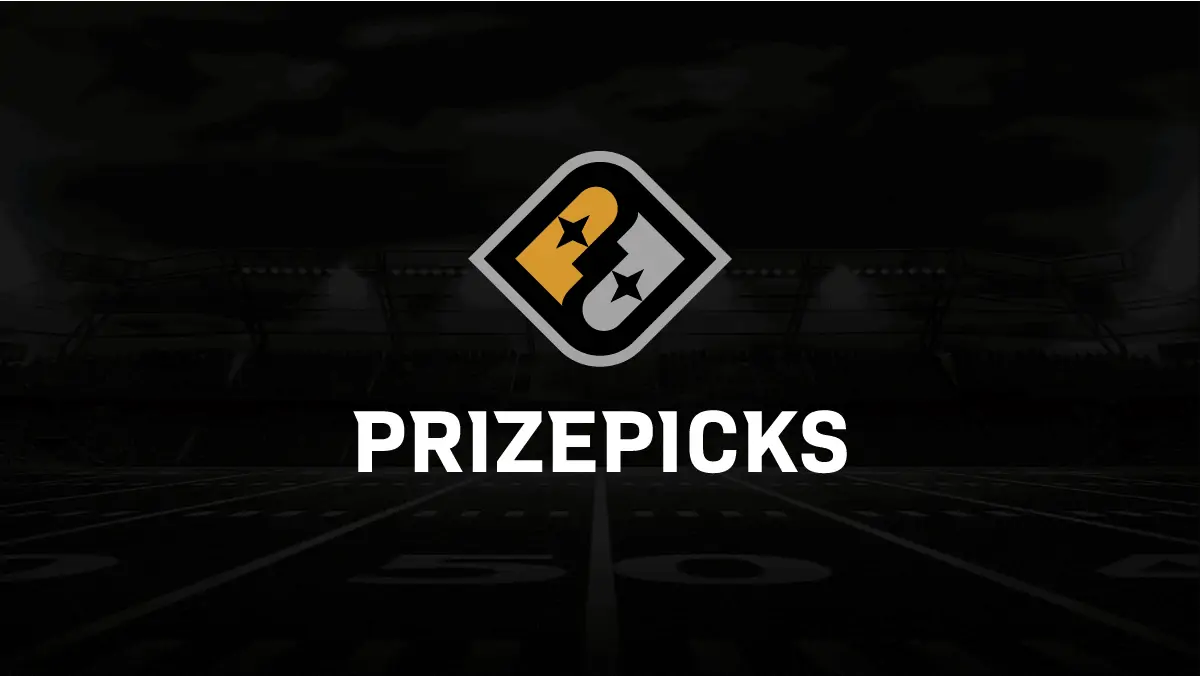Week 5 action continues with a Friday slate and DraftKings and FanDuel have great contests for these games. This college football DFS breakdown will look at each team and provide information about each skill position player of note. Make sure to check out our projections, depth charts and datasheets for more information. With that said, let’s dive into the first iteration of the Week 5 CFB DFS picks for Friday’s matchup.
College Football DFS: Week 5 Friday CFB Picks
Houston vs. Tulsa
Houston (26.75 Implied Total)
Plays/Game – 70.7 (64th)
Pass Rate – 52.36% (42nd)
Houston enters this game with a 3-1 record, including three straight wins over Rice, Grambling State and Navy. Their only loss came to Texas Tech in their opener. However, they are now 3.5-point underdogs to Tulsa. Houston continues to play fast and pass heavy football. Their offensive line has also done an excellent job pass protecting, which should be a strength again here after replacing just one starter to one of the conferences better units.
At quarterback Clayton Tune ($6,500) is a solid dual threat for Houston. Tune already has 68 yards rushing after finishing with at least 244 each of the last two seasons. Tune currently averages 182.5 yards passing per game. This number is average due to a hamstring injury suffered against Rice. Tune also played limited snaps against Grambling State as well, but he returned for last week’s tilt against Navy. Tune did not rush much, finishing with negative-1 yard rushing, but he did complete 22 of 30 passes for 257 yards. He is a strong play, but his limited mobility could hinder him here.
At running back Mulbah Car ($4,200) opened the season as the starter before getting hurt, which happens like clockwork. He returned from injury last week but lost his starting job. Houston will move forward with a committee consisting of Alton McCaskill ($5,800) and Ta’Zhawn Henry ($4,500). McCaskill played on 35 snaps to Henry’s 26 last week. He also out-carried Henry 17-11. McCaskill has easily been the most efficient back on the year as well. He has 234 yards rushing on 51 attempts, while Henry checks in at 94 yards on 22 attempts.
At receiver Nathaniel Dell ($6,900) continues to operate as the team’s alpha. He has 343 yards receiving on 38 targets (29.2% target share) to open the year. He has not seen fewer than seven targets in any game. Behind him, tight end Christian Trahan ($3,700) ranks second of the team with 138 yards receiving and 18 targets. Houston has rotated their secondary targets quite a bit, but Jeremy Singleton ($3,500) is the true WR2. He eclipsed a 72% route share in Houston’s last two games, but he only has 54 yards on eight targets this year. The next most active receiver is KeSean Carter ($3,400) with a 56% route share to open the season. Former corner, Marcus Jones (not in the DraftKings player pool) continues to see more opportunities as well but has a 35% route share.
Tulsa (30.25 Implied Total)
Plays/Game – 76.3 (29th)
Pass Rate – 49.34% (58th)
After a strong 2020 season, Tulsa opened 2021 with three straight losses for UC Davis, Oklahoma State and Ohio State. Fortunately, the Golden Hurricanes just picked up their first win over Arkansas State last week. Tulsa has played fast to start the season and is balanced in their pass/run ratio. Tulsa’s offensive line has taken a step back, despite returning all five starters. This is going to be a problem against a Houston defensive line generating immense pressure with David Anenih, Derek Parish and Latrell Bankston.
Davis Brin ($6,700) is the new Tulsa quarterback this year. Tulsa also plays uptempo football, leading to additional attempts from Brin. He currently averages 300 yards passing per game on 34 attempts. Brin is not as mobile as Tune, but he still has 11 yards rushing on the year. He currently completes 62% of his passes for 9.1 yards per attempt, eclipsing 300 yards passing each of the last two weeks. Brin is another solid price-adjusted option in a desirable game environment.
At running back Tulsa’s committee has slowly shifted towards Shamari Brooks ($4,700). On the year, Brooks has out-carried Deneric Prince ($4,800) 53-46 and out-gained him 293-260. However, Brooks handled 22 carries to Prince’s eight last week. Both backs are active in the pass game with seven targets for Prince and five for Brooks this year. It should be noted that Prince got banged up in the game, according to the coaching staff. He appears on track to play this week, potentially bringing this backfield back to a 50:50 committee. Anthony Watkins ($) will also be involved a little bit. He has 175 yards on 18 carries, but Brooks looks like the preferred play.
At receiver Tulsa will run four-wide on most plays. Tulsa’s leading receiver last year, Keylon Stokes ($4,900) did not play last week. He is a team captain and presumed starter when healthy. He has 107 yards on nine targets this year. Josh Johnson ($6,000) has been the true star among Tulsa’s receivers to open the year. Johnson has 343 yards on 37 targets (28.5% target share). He has target counts of 10 and 12 in his last two games. Behind him, JuanCarlos Santana ($4,200) ranks second on the team with 259 yards receiving and 28 targets. Sam Crawford ($5,300) ranks third with 237 yards on 21 targets. Ezra Naylor ($3,200) has stepped up in place of Crawford with a 79+% route share each of the last two weeks. Naylor received eight and three targets and now has 105 yards. This is a situation to monitor heading into Friday’s games.
Iowa vs. Maryland
Iowa (24.25 Implied Total)
Plays/Game – 65.8 (99th)
Pass Rate – 44.87% (79th)
One of the few undefeated teams left in the country, Iowa has wins over Indiana, Iowa State, Kent State and Colorado State. Iowa plays extremely slow and fairly run heavy football. Their offensive line has taken a major step back after losing four starters last year. Their lead back only averages 4.6 yards per carry and teams with stout defensive lines will give Iowa trouble. Maryland is young up front, but continually improving, while the strength of their defense is pass coverage.
Iowa’s Spencer Petras ($5,200) averages 169.5 yards passing per game on 26.3 attempts with negative-35 cumulative yards rushing. He currently completes 59.8% of his passes for a putrid 6.4 yards per attempt. Non-mobile and a below average thrower, Iowa’s offense is hindered by his presence. For DFS, he is only an option in large-field tournaments.
In the run game, Iowa uses Tyler Goodson ($6,800) as their bell-cow. Goodson has 364 yards rushing on 80 attempts. While the efficiency in the run game is middling, Goodson is a strong pass catcher. He has 61 yards receiving on 12 targets, which is tied for third-most on the team. He is a solid volume-based play in an underwhelming game.
Iowa’s offense is not conducive to aerial success, but tight end Sam LaPorta ($4,600) leads the team with 214 yards receiving and 27 targets (27.8%). Behind him, Tyrone Tracy ($4,400) has 66 yards receiving on 14 targets. Nico Ragaini ($4,000) has 113 yards on 12 targets, but his 64% route share falls below Charlie Jones ($3,100) 68% route share. None of these players are particularly strong options outside of GPPs.
Maryland (21.25 Implied Total)
Plays/Game – 75.0 (35th)
Pass Rate – 56.00% (23rd)
Another unbeaten team in the Big Ten, Maryland holds wins over West Virginia, Howard, Illinois and Kent State. Both the West Virginia and Illinois wins came down to single digits. Under head coach Mike Locksley and offensive coordinator Dan Enos, Maryland has embraced the pass. They are also running with a much quicker pace than last year’s team. Maryland has received excellent offensive line play and ranks sixth in the country in pass blocking. Iowa’s defensive line has created problems for multiple team’s this year, so this battle could decide the game. Iowa is also a top 10 team in pass coverage to open the 2021 season.
Taulia Tagovailoa ($7,000) will quarterback Maryland after a fantastic start to 2021. Tagovailoa averages 331 yards passing per game on 36.3 attempts. Tagovailoa is somewhat mobile with 33 yards on the ground as well. He currently completes 75.5% of his passes for 9.1 yards per attempt with two of the best receivers in the Big Ten. This will be Iowa’s toughest assignment yet on defense.
Since their win over West Virginia in Week 1, Maryland has increasingly turned away from the run. Tayon Fleet-Davis ($6,100) leads the team with 323 yards on 45 carries, but he has not received more than 11 carries in an individual game since Week 1. He will also split work to some degree with Isaiah Jacobs ($3,400) and Peny Boone ($3,000). Neither has much viability on their own, but they steal enough work to hurt Fleet-Davis. Fortunately, Fleet-Davis has solid pass game involvement to fall back on. He has 90 yards receiving on 14 targets, keeping him in play.
At receiver Maryland has a pair of alphas in Dontay Demus ($6,600) and Rakim Jarrett ($4,900). Demus has 446 yards on 31 targets (21.1%), while Jarrett checks in at 265 yards on 27 targets (18.4% target share. Both target shares are somewhat depressed by non-competitive games. Both should see a spike here and in other competitive spots. Behind them, Jeshaun Jones ($4,100) has emerged as the WR3 with six and seven targets in back-to-back weeks. He also has 202 yards receiving, which ranks third on the team. Interestingly, he still is not playing much more than Darryl Jones ($3,700) who eclipsed a 45% route stare in each of the last two weeks. He has 110 yards on 13 targets this year. Finally, Chigoziem Okonkwo ($3,900) is Maryland’s receiving tight end and he will run a route on about 55% of drop backs. He only has nine targets, but he has proven to be a reliable red zone weapon.
BYU vs. Utah State
BYU (33.75 Implied Total)
Plays/Game – 64.8 (107th)
Pass Rate – 44.40% (84th)
A surprising 4-0 team, BYU knocked off Arizona, Utah, Arizona State and South Florida to get here. All of their wins are by 10 points or less, but this team has out-performed expectations after returning just seven starters on offense and four on defense. BYU continues to play slow football with a slightly below average pass rate. The offensive line has held up despite losing three players. They still returned 86 starts, so their early season success makes sense. Utah State cannot generate pressure of any kind, so BYU should find ways to produce on offense.
BYU quarterback Jaren Hall ($8,800) missed last week’s game with an injury, thrusting Baylor Romney ($8,500) into the starting lineup. Romney played well in relief with 305 yards passing and three touchdowns against a horrific South Florida defense. BYU expects Hall back this week, which should help the offense. Hall is an excellent dual threat with 166 yards rushing already this year. He only averages 187 through the air on 28.3 attempts, but he completes 60% of his passes for 6.6 yards per attempt. Hall is a solid dual-threat option on this slate.
At running back Tyler Allgeier ($7,100) has somewhat separated himself from Lopini Katoa ($3,800). Allgeier has 351 yards on 80 attempts this year, while Katoa checks in with 135 yards on 29 attempts. Katoa does have a slight edge with six targets to Allgeier’s four, but this backfield has swing sharply in Allgeier’s direction. Katoa looks like a pure change of pace at this point.
Unlike last year, BYU has been a relatively low-volume passing attack to open the year. Neil Pau’u ($6,300) leads the team with 232 yards receiving and 26 targets (24.8% target share. He is followed closely by Gunner Romney ($7,600) with 227 yards on 17 targets. Utah transfer Puka Nacua ($4,300) has 139 yards on 14 targets. Tight end Isaac Rex ($4,000) ranks fourth with 41 yards on 10 targets. The routes run reflect this target distribution as well. The only potential edge is with Romney coming in a bit underpriced. He missed most of Week 1, contributing to an 11-target game for Pau’u, which elevates his season-long numbers. Any of these players are options.
Utah State (24.25 Implied Total)
Plays/Game – 83.0 (6th)
Pass Rate – 49.00% (62nd)
Utah State enters this contest fresh off their first loss of the year to Boise State. Prior to that, they knocked off Washington State, North Dakota and Air Force. The Washington State and Air Force wins both occurred by 4 points or less. This team is playing much faster than last year when they managed just 62.7 plays per game. Their pass rate is about the same as they take a balanced approach. Overall, their offensive line is middling, but BYU has taken a major step back on defense, as expected.
Utah State continues to use two quarterbacks, but the balance has shifted in Arkansas State transfer Logan Bonner‘s ($7,400) direction. Bonner played 43 snaps to Andrew Peasley’s ($6,900) 21 last week. Peasley is a pure dual threat with 140 yards rushing and little upside as a passer. Bonner only has 26 yards rushing, but he averages 242.3 through the air on 29.5 attempts. Bonner has been banged up at times this season, but he looks like the better option in this offense. Because of the time share, both are limited to GPPs.
In the run game for Utah State, Calvin Tyler ($6,400) continues to separate himself from John Gentry ($3,600) and Elelyon Noa ($3,300). He now has 19 carries in back-to-back games and easily leads the team with 403 yards rushing. For reference, Gentry checks in with 150 yards on 29 carries, while Noa has 112 yards on 24 carries. Utah State will also use their backs in the pass game. Tyler has six targets to Gentry’s five so far.
At receiver Deven Thompkins ($7,300) continues to tear up the Mountain West conference with 519 yards on 46 targets (31.3% target share). Behind him, Justin McGriff ($3,800) has the second most targets at 27, but he only has 159 yards receiving. Still, his 97% route share, bested Arkansas State transfer Brandon Bowling‘s ($5,700) 72% route share. Bowling has been far more efficient, turning 25 targets into 326 yards, but McGriff continues to play more. Derek Wright ($3,900) also reasserted himself as the WR4 with a 67% route share to Savon Scarver‘s ($3,000) 33% route share. Wright has 168 yards receiving to Scarver’s 14, making Wright the superior dart throw in this Utah State passing attack.
Thanks for reading to the end of this article! If you appreciate this free content and want to see more of it every day, you can help us out by sharing this article on social media!
[CFBPAGE]

















